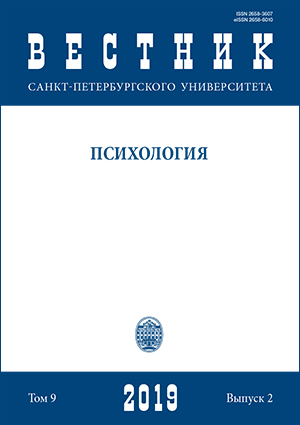Posttraumatic stress and family structure
DOI:
https://doi.org/10.21638/spbu16.2019.207Abstract
The article presents the study of the connection between the signs of posttraumatic stress symp- toms and family structure. Sixty-two women participated in the online survey (average age — 37.09). Methods used: Impact of Event Scale (IES) and the questionnaire FACES IV (“Family Adaptation and Cohesion Scale”), which allows evaluating the parameters of the family system on 8 scales (balanced: cohesion, flexibility; unbalanced: disengaged, enmeshed, rigid, chaotic and two additional scales — the family communication and the family satisfaction). It is shown that avoidance and physiological arousal and two dimensions of the family structure (chaotic, cohesiveness) are interrelated: the higher the level of posttraumatic stress, the more chaotic and less cohesive respondents perceive their family. Analysis of the data showed that avoidance and physiological arousal are most involved in the process of interaction of family members, in contrast to the symptoms of intrusion. It is emphasized that the manifestations of avoidance are lower in family systems with a high level of cohesion, and physiological arousal — in more balanced family systems, where a high level of cohesion is combined with low levels of disengaged and enmeshed. The theoretical significance of the study makes it possible to clarify the mechanisms of how posttraumatic stress are manifested not only at the level of an individual but at the level of his family. This study is a pilot. In the future, we assume the expansion of the sample by sex. This will allow to develop a model of the connection between the types of fam- ily structure and individual parameters of PTSD and formulate focuses of psychotherapy with families in which one of the family members has experienced the trauma.
Keywords:
posttraumatic stress symptoms, family structure, traumatic stress, family system
Downloads
References
of Family Psychology. 2010. Vol. 24 (3). P. 280–288.
Downloads
Published
How to Cite
Issue
Section
License
Articles of "Vestnik of Saint Petersburg University. Psychology" are open access distributed under the terms of the License Agreement with Saint Petersburg State University, which permits to the authors unrestricted distribution and self-archiving free of charge.




